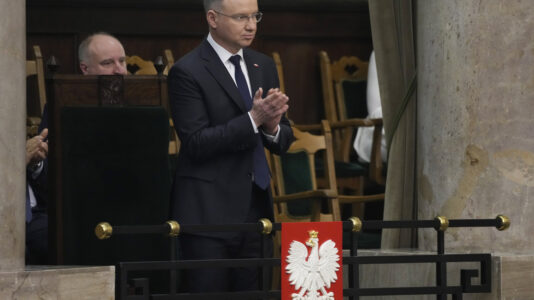The news of the Slovak PM Robert Fico’s assassination attempt had barely sunk in when Warsaw and the rest of the country were introduced to controversial campaign videos.
The clips differ in their approach; the governing Civic Platform’s (PO) spot is more direct and aggressive, while the conservative Law and Justice (PiS) opposition’s is somewhat more cautious.
This is ironic, given that PiS has historically been adept at launching venomous attacks and is often blamed for the grim state of Polish political debate. In a notably well-edited black-and-white video published by PO, numerous connections between PiS and Russia are alleged.
The tone was so striking that a TVN journalist, from an influential liberal television station, questioned in a studio whether Jacek Kurski, PiS’ main propagandist, had produced it. A PO representative responded, acknowledging the timing might not be ideal, especially considering the events in Slovakia, but insisted that every line in the clip was truthful.
The assassination of Gdańsk’s mayor, Paweł Adamowicz, by a mentally ill ex-convict in early 2019 is a grim reminder of Poland’s own history of political murders. The aftermath did not bring any revitalization to Polish politics. At that time, PiS called for reconciliation among political rivals, but the shocked PO rejected these overtures, as the state broadcaster had suggested that only the opposition’s rhetoric had contributed to Adamowicz’s death.
Returning to the present, it seems voters are supposed to choose between two covert (and now exposed by careful politicians) Russian agencies if they take the newly released spots seriously. This, of course, is absurd — neither PiS nor PO members are Putin’s servants. Although the threat of Russian influence in Poland cannot be dismissed outright, it should be addressed seriously rather than childishly.
Tusk does not serve Putin, but he was the prime minister from 2007 to 2014, a time when much of the West was under the illusion that sensible negotiations with Russia were possible. Perhaps Tusk himself was partly to blame for spreading this naive illusion which gave Putin time to prepare for war with the West.
Opposition leader Jaroslaw Kaczyński is not paid by the Kremlin but his party which, with its theories about Brussels conspiracies and German revanchism, has driven a wedge into European unity and weakened many of Poland’s bonds with allies. Doesn’t this play into Russia’s hands? These are all legitimate civic and electoral dilemmas. There’s no need to invent betrayal.
However, both Tusk and Kaczyński are skilled at tapping into what their current or potential voters want, a trait that has made them central figures in Polish politics over the past two decades. As the upcoming European Parliament elections approach, these spots may also test voters. If they are tired of the tone of Polish politics, they have several options to shake up the two main parties.
Liberal supporters of Tusk might turn to the Left, while centrist voters from both parties might look towards the Polish People’s Party (PSL) and Poland 2050. Turnout and results will reveal whether Polish voters truly believe that anyone who disagrees with them or simply thinks and acts foolishly (in their eyes) must necessarily be a Russian agent.






